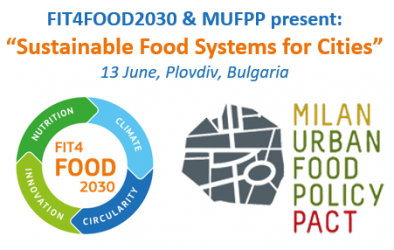- International conference
Are you committed to a healthy and sustainable future for your city? FIT4FOOD2030 invites you to join “Sustainable Food Systems for Cities”, an opportunity to explore selected Research and Innovation (R&I) initiatives within the cities involved in the Milan Urban Food Policy Pact (MUFPP).
During the event you will investigate selected initiatives and work together to identify what makes them successful. You will also have the chance to network with your peers from others European cities and to learn more about FIT4FOOD2030 and how it supports the implementation of the European Commission's FOOD 2030 policy framework to future-proof European food systems through R&I.
Finally, the event will celebrate the newest addition to the MUFPP, the city of Plovdiv, in the presence of the Mayor.
More information, a draft agenda and a registration link can be found here.
Date: 13 June 2018, from 14:00 to 17:00
Venue: House of Culture – 15, Gladston Street, Plovdiv, Bulgaria (close to the Municipality of Plovdiv)
"Sustainable Food Systems for Cities" is a key side-event of the flagship conference "Research & Innovation for Food and Nutrition Security – Transforming our food systems" taking place in Plovdiv on 14-15 June under the patronage of the Bulgarian Presidency of the European Council and the European Commission.

